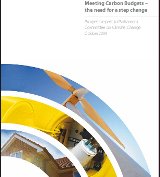Article from: www.thenewspaper.com/news/29/2927.asp
10/12/2009
UK Government: Per Mile Tax Would Solve Global Warming
UK government group believes punishing drivers with new taxes will stop global warming.
 A UK government group today released a proposal that would impose a per-mile tax on motorists to rescue the planet from an imagined catastrophe. The Committee on Climate Change (CCC), a body established by the UK Parliament to advise the government on environmental issues, has set a target of a two-percent annual reduction in carbon dioxide (CO2) emissions. CO2 is a naturally occurring gas that is essential to human life. The committee believes it can reach its goal by imposing massive new taxes on drivers that will reduce demand for driving which, in turn, would reduce carbon dioxide output.
A UK government group today released a proposal that would impose a per-mile tax on motorists to rescue the planet from an imagined catastrophe. The Committee on Climate Change (CCC), a body established by the UK Parliament to advise the government on environmental issues, has set a target of a two-percent annual reduction in carbon dioxide (CO2) emissions. CO2 is a naturally occurring gas that is essential to human life. The committee believes it can reach its goal by imposing massive new taxes on drivers that will reduce demand for driving which, in turn, would reduce carbon dioxide output.
"Evidence in this report suggests that road pricing would result in a significant emissions reduction (e.g. around 6 MtCO2 in 2020) if there were no offsetting reductions in other aspects of transport pricing (i.e. fuel duty, vehicle excise duty)," the report explained. "The committee recommends therefore that the government should seriously consider road pricing."
Already, taxes account for half of the cost of gasoline in the UK. Officials have already approved an increase in the gas tax of 6p (US 10 cents) by 2013. In addition, the group proposed reducing the national 70 MPH highway speed limit to 60 MPH and using GPS-enabled devices to cut off power to engines attempting to exceed existing limits.
"Given that the 70 mph speed limit is an existing policy, the committee believes that the government should seriously consider enforcing this, either through the current enforcement mechanism, or through rolling out Intelligent Speed Adaptation technology to both new and existing cars," the report explained.
Another 4.6 million drivers would be forced to go through "eco training." Taxpayers would also heavily subsidize the purchase of electric vehicles and the new infrastructure that would be required to recharge them. The report explained that batteries for an electric vehicle with an 80-mile range cost $13,000, while those of a vehicle with a 200-mile range cost $42,000. As most consumers would refuse to spend such a premium, the report recommended £9.8 billion (US $15 billion) in subsidies to promote the technology.
"Implementation of the required measures to achieve budgets would in some instances save people and businesses money and in total cost less than one percent of GDP," the report explained.
In other words, the whole suite of CCC proposals would cost the British economy a total of $26,800,000,000. Chapter six of the report is excerpted in a 4mb PDF file at the source link below.
Source: Meeting Carbon Budgets -- Chapter Six (UK Committee on Climate Change, 10/12/2009)
Permanent Link for this item
Return to Front Page
 A UK government group today released a proposal that would impose a per-mile tax on motorists to rescue the planet from an imagined catastrophe. The Committee on Climate Change (CCC), a body established by the UK Parliament to advise the government on environmental issues, has set a target of a two-percent annual reduction in carbon dioxide (CO2) emissions. CO2 is a naturally occurring gas that is essential to human life. The committee believes it can reach its goal by imposing massive new taxes on drivers that will reduce demand for driving which, in turn, would reduce carbon dioxide output.
A UK government group today released a proposal that would impose a per-mile tax on motorists to rescue the planet from an imagined catastrophe. The Committee on Climate Change (CCC), a body established by the UK Parliament to advise the government on environmental issues, has set a target of a two-percent annual reduction in carbon dioxide (CO2) emissions. CO2 is a naturally occurring gas that is essential to human life. The committee believes it can reach its goal by imposing massive new taxes on drivers that will reduce demand for driving which, in turn, would reduce carbon dioxide output.